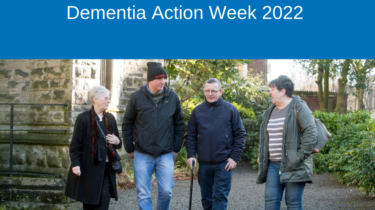“Life isn’t over after a dementia diagnosis” say Dementia NI members

In the run-up to Dementia Action Week 2022, many of our members have shared with us how getting a diagnosis has brought them relief at having their symptoms validated and a new lease of life thanks in part to the peer support offered by Dementia NI.
While there is no doubt that getting a diagnosis can be very daunting, several members said they felt their diagnosis gave them peace of mind in the long-term and enabled them to reach out and get the right treatment and support which has helped them to live well.
Some members reported that it has motivated them to take things one day at a time and live life to the full by focusing on what they can do, not what they can’t.
Our members’ views that a diagnosis can be a positive event in the long-term supports a study by the Alzheimer’s Society that found 91% of people with dementia think it’s better to know.
Our Founding Member, John McErlane, 63, from Toomebridge was diagnosed with dementia in 2011, motivating him to set up Dementia NI along with four other people living with dementia. He said in some ways his diagnosis had a positive impact because “it helped me make sense of my symptoms and enabled me to plan and be realistic about what I can do.”
Member Martin Murtagh, from Belfast, who was diagnosed with Alzheimer’s Disease aged 63, said, “My diagnosis has given me peace of mind. The earlier you get a diagnosis the sooner you can get help. My medication is really helping me. If I didn’t take it, I know I would be further on. It hasn’t stopped the symptoms but it slows the process down.”
Martin added, “Getting diagnosed with dementia made me realise how important it is to plan for your care early on. I’ve had a conversation with my sons about whether I will be cared for in a home or live with one of them when my dementia progresses. It's important to me to speak honestly and do what I can to make it easier for my family.”
Martin also shared how getting diagnosed can help people with dementia access valuable support. “I was told to contact Dementia NI and staff there put me in touch with other people in the early to mid stages of dementia who know exactly what it’s like for me. The craic is ninety in the peer support groups! We work on some fantastic projects to help improve things for local people with dementia. It has given me hope and a will to carry on.”
While a diagnosis was helpful for many of our members in the long-term, many found there were considerable challenges to getting a diagnosis and felt more support could be offered at the point of diagnosis.
One member shared how his dementia was initially misdiagnosed as depression, which led to a delay in treatment: “For several years I met with different mental health workers and GPs who didn’t fully help with my diagnosis. They kept saying, ‘You’ve got depression’ but I knew it wasn’t depression. I’d advise people to keep pushing for the right diagnosis because it will be extremely helpful to you.”
Martin said he would've benefited from more information at the point of diagnosis: “I was honest with my GP about my symptoms and had to wait ages to get a brain scan but once I had that I got my diagnosis quickly. I was told, “Well, you’ll be alright Martin”. It would’ve been useful to have been given information packs about dementia at that point. It would’ve helped me explain my diagnosis to my four sons.”
Another member agreed that more information should be provided at the point of diagnosis: "The diagnosis appointment was only five minutes long and felt so blunt and cold. The doctor talked only to my wife and said I needed to get my affairs in order. I did not hear from anyone for three weeks; no information was provided at the appointment."
One member recalled how when he received his diagnosis, the doctor "wasn't talking to me, he was talking to my son" while another member shares how when she went to the doctor's office she was "made to feel so small. It was as if I was invisible."
Stephanie Green, Development Manager at Dementia NI, said, “This Dementia Action Week, we want people to understand that the life you live and love doesn’t end when you receive a dementia diagnosis.
“We know that dementia is one of the most misunderstood conditions and a diagnosis can have a life-changing impact on people and their families – but getting a timely and accurate diagnosis will enable you to live as well as possible. Many of our members who waited to get a diagnosis for years wish they’d received it sooner.
“A diagnosis means you can access the best support and treatment which can make a huge difference. A diagnosis also gives you information and the ability to plan while you still have the capacity to make key decisions.
“Our members diagnosis stories shine a light on inconsistencies across the dementia care pathway. Many people are struggling to get a quick and accurate diagnosis and experiences vary greatly. If the dementia care pathway from diagnosis to end of life was standardized, it would help address this.
“We want everyone to know that Dementia NI is here for anyone with a dementia diagnosis in the early to mid-stages of the condition, and there are many ways we can help you. This includes our peer support groups and our In The Same Boat service, which sees Dementia NI members provide one-to-one support to those who are newly diagnosed.”
Click here for more information on getting a diagnosis and why early diagnosis is important.